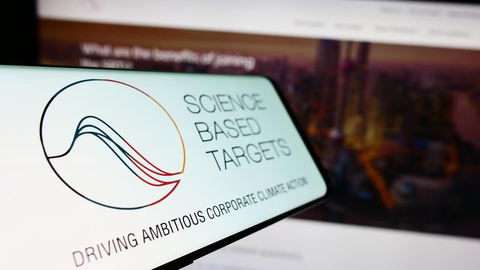
Bayer Announces ‘Project Enhanced S3’ to Enable Companies to Realize Additional Sustainability Value from Carbon Removal Projects
Published by Todd Bush on November 21, 2024
Sustainability leaders can pioneer the new program by joining the limited pilot launch
ST. LOUIS--(BUSINESS WIRE)-- Bayer announced today an expanded approach to its programs that sequester carbon and reduce emissions for companies along the food value chain through regenerative agriculture practices. In addition to helping to reduce these companies’ Scope 3 emissions, “Project Enhanced S3” will include data on benefits from regenerative agriculture practices, such as soil health, more efficient water usage, enhanced biodiversity, and economic support for farmers.

Bayer Ecosystem Services, the business unit that is focused solely on developing sustainability solutions for companies with science-based targets, is creating additional opportunities for customers to obtain value from the myriad data required of carbon programs. Project Enhanced S3 will focus on giving businesses one more advantage as they build a sustainability strategy.
>> In Other News: Nimbus and Toshiba Announce Joint Development of Next-Generation Pure Hydrogen Fuel Cell Stack
Advancing Carbon Removal with Project Enhanced S3
Project Enhanced S3 is currently in development, with the goal of helping companies quantify, measure, and report the added value of carbon projects taking place on farms in their supply chain, along with a portal to enable them to more easily access insights.
“This is yet another way we’re able to measure and quantify the comprehensive benefits for farmers working to reduce global carbon emissions and bringing it to scale with our global reach, local presence, and strong relationships.”
Unlocking Co-Benefits through Bayer Ecosystem Services
With this enhanced focus on co-benefits, Bayer Ecosystem Services, the business unit focused solely on developing sustainability solutions for companies with science-based targets, is creating additional opportunities for customers to obtain value from the myriad data required of carbon programs. Historically, data collected from farmers in the Bayer Carbon Program has been used primarily to understand how field-level practices, such as no-till or cover crops, can sequester and reduce carbon. The project aims to use that same data to highlight co-benefits like soil health and biodiversity without adding administrative burden on farmers.
“By leveraging digital farming tools and deep agronomic expertise, Bayer’s Project Enhanced S3 is uniquely positioned to support the food and beverage industry in driving more impact,” said Leonardo Bastos, Senior Vice President of Ecosystem Services at Bayer Crop Science.
Supporting Sustainability Strategies
Project Enhanced S3 will focus on giving businesses an advantage as they build a sustainability strategy. Bayer’s solutions leverage agronomic expertise, scientific innovation, and digital farming technology, such as ForGround by Bayer and Climate FieldView™, to help businesses thoroughly vet solutions, demonstrate progress, and report on climate investments.
Participation in Bayer’s Project Enhanced S3 is now available for a limited number of select business customers and sustainability leaders.
“By participating, businesses can not only support their own climate goals but also help drive sustainability solutions across the food supply chain through regenerative agriculture,” said Bastos.
To secure a place in the limited pilot launch, visit BayerForGround.com/Request-Demo. For more information about Bayer Ecosystem Services, visit Bayer.com/EcoServices.
About Bayer
Bayer is a global enterprise with core competencies in the life science fields of health care and nutrition. In line with its mission, “Health for all, Hunger for none,” Bayer’s products and services are designed to help people and the planet thrive by addressing challenges such as population growth and aging. The Group aims to increase its earning power and create value through innovation and growth while driving sustainable development.
The Bayer brand represents trust, reliability, and quality worldwide. In fiscal 2023, Bayer employed around 100,000 people and generated sales of €47.6 billion, with R&D expenses before special items amounting to €5.8 billion. For more information, go to www.bayer.com.
Subscribe to the newsletter
Daily decarbonization data and news delivered to your inbox
Follow the money flow of climate, technology, and energy investments to uncover new opportunities and jobs.
Latest issues
-
This $4.1M Deal Could Change Carbon Capture's Playbook
Inside This Issue 🗜️ CarbonQuest Lands $4.1M Alberta Deal on Gas Compressors 🛡️ CADO, 123Carbon, and Assure SAF Registry Join Forces to Tackle SAF Integrity Gaps ✈️ ISCC, OMV, and Airbus Partner t...
-
Can Koloma Crack Iowa's Billion-Year-Old Secret?
Inside This Issue ⛏️ Iowa's Hydrogen Rush: Can Koloma Strike Gold Before Rules Kick In? ✈️ Bentley Commits to Use 100% Sustainable Aviation Fuel for Car Airfreight 🌬️ Minister Parrott Provides Upd...
-
$47M Just Poured Into This SAF Producer
Inside This Issue 💰 LanzaJet Announces $47M in New Capital and First Close of Equity Round at $650M Pre-Money Valuation 🚢 Maersk's Ethanol Bet Could Reshape U.S. Fuel Markets 🪨 Canada Nickel and t...
Company Announcements
-
Feedstocks are Perennial Grasses and other Renewable Biomass Sources FREDERICK, Md., Feb. 18, 2026 /PRNewswire/ -- Do you know why passenger and freight planes are not using renewable biofuel? It'...
-
Vancouver, British Columbia--(Newsfile Corp. - February 25, 2026) - Q Precious & Battery Metals Corp. (CSE: QMET) (OTC Pink: BTKRF) (FSE: 0NB) ("QMET" or the "Company") congratulates Quebec Inn...
-
Carbon Direct and C2X Announce Collaboration on Pioneering Forestry Residue-to-Biofuel Project
Collaboration on C2X’s Beaver Lake Biofuels project advances biomass carbon removal and storage as a scalable climate solution, transforming Louisiana’s forestry and sawmill residues into biofuel a...
-
Carbon Direct and C2X Announce Collaboration on Pioneering Forestry Residue-to-Biofuel Project
Collaboration on C2X’s Beaver Lake Biofuels project advances biomass carbon removal and storage as a scalable climate solution, transforming Louisiana’s forestry and sawmill residues into biofuel a...